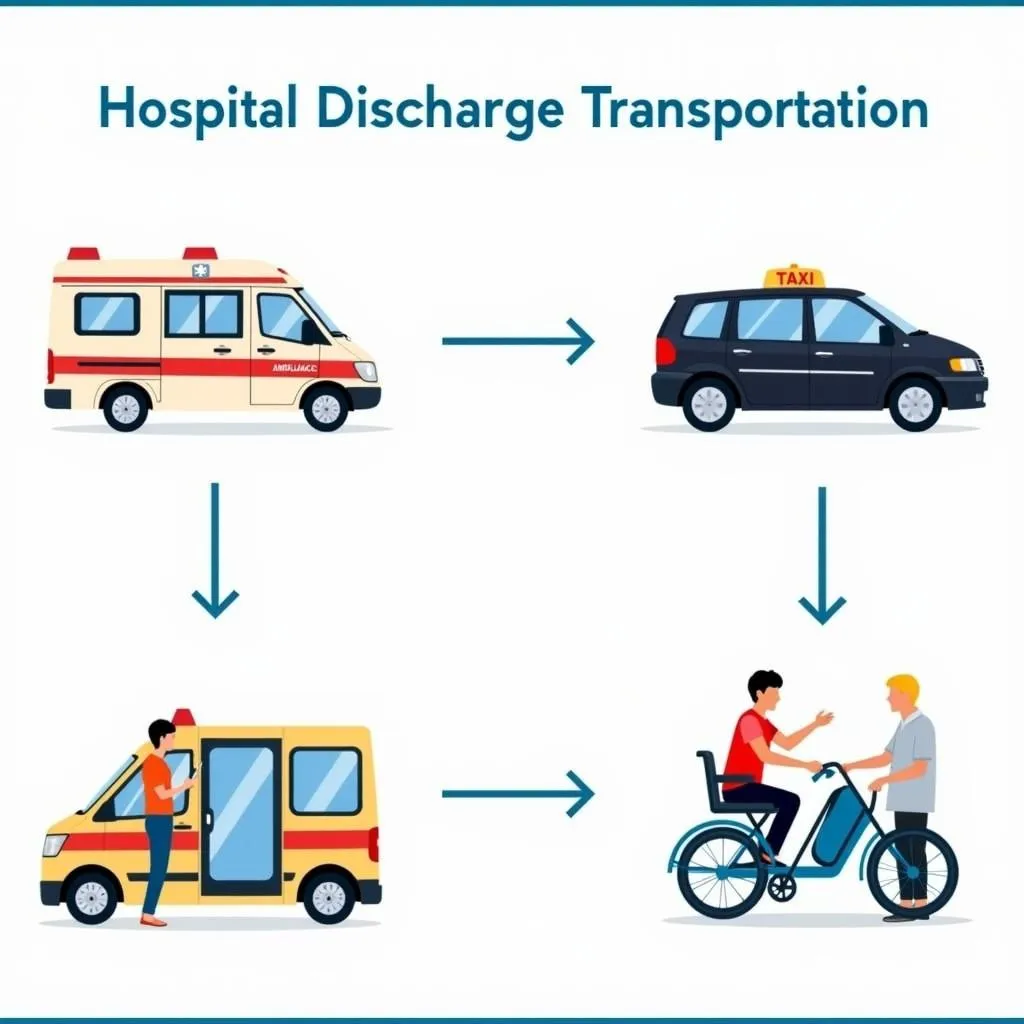After a hospital stay, the journey home should be as comfortable and stress-free as possible. Hospital Discharge Transportation plays a crucial role in ensuring a smooth transition back to the comfort of your own home, or a care facility, while addressing your individual needs and medical considerations.
Understanding Your Hospital Discharge Transportation Options
 Hospital Discharge Transportation Options
Hospital Discharge Transportation Options
Choosing the right transportation method is essential for a safe and successful discharge. Several factors come into play when evaluating the best option for you or your loved one, including:
- Medical Condition: The nature and severity of your condition will heavily influence the type of transport required. For individuals with mobility limitations or requiring ongoing medical attention, a specially equipped medical transport service is crucial.
- Distance: Traveling long distances post-discharge may necessitate non-emergency medical transportation or air ambulance services depending on your medical needs and preferences.
- Level of Support: Consider the level of assistance needed during transit. Some patients may require a medical professional’s presence, while others might only need help with luggage and mobility.
- Budget: Hospital discharge transportation costs vary depending on the service provider, distance, and level of care. It’s essential to understand the financial implications and explore potential coverage options.
Common Hospital Discharge Transportation Services
1. Non-Emergency Medical Transportation (NEMT)
NEMT services cater to individuals who require medical supervision or assistance but don’t need emergency care during their journey. These services typically utilize wheelchair-accessible vans or cars equipped with basic medical supplies and staffed by trained personnel.
2. Ambulatory Transportation Services
Ambulatory transportation services are suitable for patients who can walk or require minimal assistance. They often operate on a pre-scheduled basis and can be a cost-effective option for shorter distances.
3. Private Transportation
Family or friends can provide transportation in certain situations. However, it’s crucial to assess the patient’s needs and the caregiver’s ability to provide adequate support and assistance.
Planning Your Hospital Discharge Transportation
 Hospital Discharge Planning Meeting
Hospital Discharge Planning Meeting
“Effective discharge planning is key to a smooth transition,” says John Smith, a certified discharge planner with over 15 years of experience. “Early communication with your healthcare team allows ample time to explore suitable transportation options and address any potential challenges.”
Here are some essential steps for a well-coordinated discharge:
- Initiate the Conversation Early: Inform your medical team about your transportation needs as soon as possible to allow sufficient planning time.
- Gather Information: Inquire about the hospital’s discharge planning services and request a list of reputable transportation providers in the area.
- Verify Insurance Coverage: Check with your insurance provider to understand what types of hospital discharge transportation are covered and the extent of their financial assistance.
- Confirm Transportation Details: Once you’ve chosen a provider, confirm all details, including pick-up and drop-off times, addresses, and any special requirements.
Ensuring a Seamless Transition Home
Beyond the logistics, several factors contribute to a positive and comfortable experience:
- Communication is Key: Maintain open communication with your healthcare providers, transportation staff, and family members to ensure everyone is informed and prepared.
- Pack Essential Items: Keep medications, medical documents, and personal belongings easily accessible during the journey.
- Address Comfort Needs: Ensure the chosen transportation accommodates any specific comfort requirements, like temperature control or seating arrangements.
By addressing these aspects proactively, you can minimize stress and ensure a safe and comfortable journey back home.
Hospital Discharge Transportation FAQs
1. Does insurance cover the cost of transportation home from the hospital?
Insurance coverage for hospital discharge transportation varies greatly depending on the policy and provider. It’s essential to contact your insurance company directly to understand your specific benefits.
2. What if I need transportation to a location other than my home?
Most transportation services accommodate requests for drop-offs at various locations, such as rehabilitation facilities or a family member’s home. Be sure to communicate your desired destination clearly when booking.
3. Can a family member transport me instead of using a specialized service?
Family or friends can provide transport; however, assess your needs and their ability to offer adequate support and assistance. This option might not be suitable for individuals requiring medical supervision during transit.
Need Help with Hospital Discharge Transportation?
Navigating the complexities of hospital discharge can be challenging. At San Jose Hospital, we prioritize your well-being even after your stay. Contact our dedicated patient liaison team at 02437655121 or email us at [email protected]. We’re here to answer your questions, provide guidance on transportation options, and ensure a smooth and safe journey home. You can also visit us at our location, Fortis Hospital Vasant Kunj New Delhi for a personalized consultation.
Remember, a smooth transition home is crucial for a successful recovery. By understanding your options and planning in advance, you can ensure a comfortable and stress-free journey.